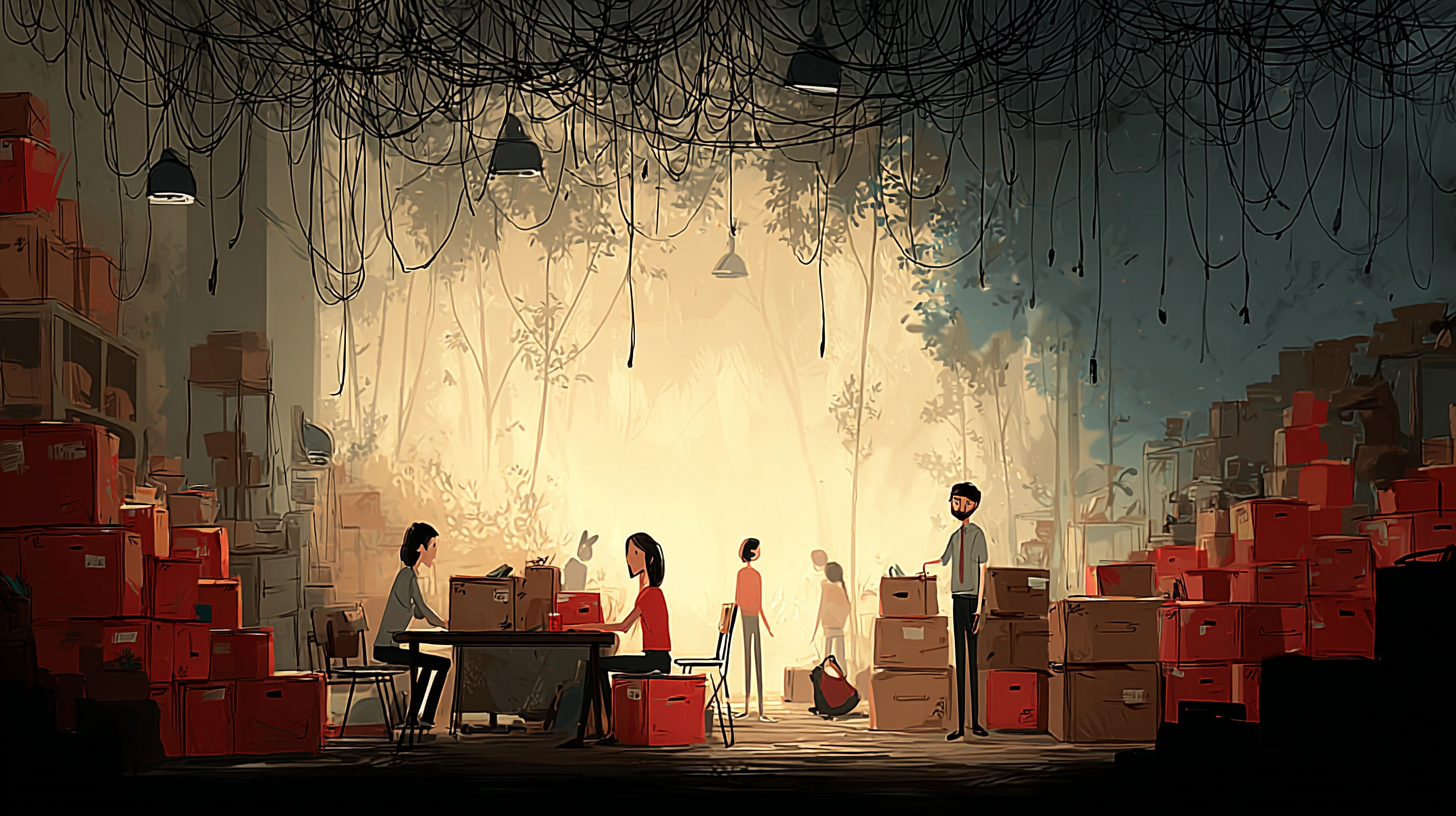“Stuff” means things in general or to put things into something.
「stuff」は、いろいろな「もの」や「物を詰める」という意味の言葉。
以下は英単語 “stuff” に関するストーリー型学習コンテンツです。まずは大枠の意味を理解して最後の文章で確認しましょう。
主な意味(main meaning)
| 品詞 | 意味 | 発音記号 | 英語例文 |
|---|---|---|---|
| 名詞 | 物・もの・材料 | /stʌf/ | I put all my stuff in the box. |
| 動詞 | 詰める・押し込む | /stʌf/ | She stuffed clothes into her bag. |
語源(etymology)
古英語「stuffen」(満たす、詰める)や古フランス語「estoffe」(材料)から来ており、「物を詰める」や「材料」というイメージが核。
類義語(synonyms)
| 類義語 | 例文 |
|---|---|
| things | Please pack your things before leaving. |
| items | The store sells many useful items. |
| belongings | He left his belongings in the hotel. |
| materials | We need more materials for the project. |
| gear | He carried all his camping gear. |
反義語(antonyms)
| 反義語 | 例文 |
|---|---|
| nothing | There was nothing in the box. |
| emptiness | The room was filled with emptiness. |
コロケーション(collocations)
| コロケーション | 例文 |
|---|---|
| personal stuff | I don’t like to talk about my personal stuff. |
| old stuff | We donated our old stuff to charity. |
| pack stuff | I need to pack stuff for the trip. |
| random stuff | My desk is full of random stuff. |
| cooking stuff | She bought some cooking stuff for dinner. |
2項表現(binomials)
| 2項表現 | 例文 |
|---|---|
| bits and pieces | I found bits and pieces of paper on the floor. |
| odds and ends | The drawer was full of odds and ends. |
英語ストーリー(english story)
タイトル: The Office Cleanup Day
Last Friday, our office decided to have a “Cleanup Day.” Everyone brought boxes to pack their stuff. Sarah started with her desk, which was full of random stuff like old pens, papers, and cables. “I didn’t know I had so many things,” she laughed. John, on the other hand, had very few items. “I keep my desk clear, so I don’t lose my belongings,” he explained.
We found many materials that could still be useful, like extra paper and unused envelopes. But there was also a lot of old stuff that nobody needed. We decided to donate the good items to charity.
During the cleanup, Sarah stuffed a large bag with clothes she had kept under her desk for years. “Why did you keep these here?” I asked. “I thought they might be useful one day,” she said with a smile.
When we opened the storage room, we found shelves filled with gear from old company events—tents, sleeping bags, and banners. There were also bits and pieces of equipment and odds and ends like broken staplers.
At the end of the day, we felt lighter. The office looked bigger and cleaner. We kept only what we needed and removed the emptiness from our storage by replacing it with organized shelves. “Now we have space for new projects,” John said. And we all agreed that sometimes, letting go of unnecessary stuff is the best way to move forward.
和訳
先週の金曜日、私たちのオフィスは「大掃除の日」を行うことにしました。みんな箱を持ってきて、自分の**stuff(もの)を詰めました。サラは机から始めました。そこには古いペン、紙、ケーブルなどrandom stuff(雑多なもの)がいっぱいでした。「こんなにたくさんのthings(物)があったなんて知らなかった」と彼女は笑いました。一方ジョンはitems(品物)がとても少なく、「机をきれいにしておけば、自分のbelongings(持ち物)**をなくさないんだ」と説明しました。
使えそうな**materials(材料)もたくさん見つかりましたが、誰も必要としないold stuff(古いもの)**もありました。良い品物はチャリティーに寄付することにしました。
掃除の途中、サラは机の下に何年も置いていた服を大きな袋にstuffed(詰め込んだ)。「なんでここに置いてたの?」と私が聞くと、「いつか使えると思って」と笑顔で答えました。
物置を開けると、会社の古いイベントで使った**gear(道具)が棚いっぱいにありました。テント、寝袋、バナーなどです。さらに壊れたホッチキスのようなbits and pieces(断片)やodds and ends(がらくた)**も見つかりました。
一日の終わりには気分が軽くなりました。オフィスは広く、きれいに見えました。必要なものだけを残し、棚を整理して物置の**emptiness(空虚さ)をなくしました。「これで新しいプロジェクトのスペースができた」とジョンが言い、みんなも不要なstuff(もの)**を手放すことが前進の一番の方法だと同意しました。
Q&A
Q: 「stuff」と「things」の違いは何ですか?
A: どちらも「物」を指しますが、「stuff」はより口語的でまとまりを意識しない漠然とした表現です。「things」は少し広く使え、具体的にも抽象的にも使えます。
Q: 「stuff」と「items」の違いは何ですか?
A: 「items」はリストやカタログのように、個別に数えられる具体的な品物を指します。「stuff」はそのように区切らず、全体をまとめて指します。
Q: 「stuff」と「belongings」の違いは何ですか?
A: 「belongings」は「所有物」や「持ち物」で、個人に所有権がある物を指します。「stuff」は必ずしも所有している物とは限らず、物全般を指せます。
Q: 「stuff」と「materials」の違いは何ですか?
A: 「materials」は「材料」や「資源」という意味で、何かを作るために使う物に特化しています。「stuff」は用途を限定せず、物全般を指します。
Q: 「stuff」と「gear」の違いは何ですか?
A: 「gear」は特定の活動(例:スポーツ、旅行、キャンプなど)に必要な道具や装備を指します。「stuff」は活動に限定せず、何でも含みます。
Q: 「stuff」と「personal stuff」の違いは何ですか?
A: 「personal stuff」は「自分に関する物事」で、物だけでなく個人的な用事や事情も含む場合があります。「stuff」はそういった意味の限定がありません。
Q: 「stuff」と「old stuff」の違いは何ですか?
A: 「old stuff」は「古い物」限定で、「stuff」の中でも年代が古かったり使い古された物を指します。「stuff」は新しい物も含みます。
Q: 「stuff」と「random stuff」の違いは何ですか?
A: 「random stuff」は「バラバラな物」や「まとまりのない物」を指します。「stuff」はまとまっているかどうかを問わない表現です。
Q: 「stuff」と「cooking stuff」の違いは何ですか?
A: 「cooking stuff」は料理に関連する物(調味料や器具など)を指します。「stuff」はその範囲を限定しません。



コメント